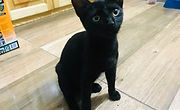KITTEN/CAT CARE
It's cuddling time !
Kittens <1 year old
As helpless as a human baby at birth, the early weeks of a kitten's life are critical to survival and the mother-kitten bond is very special. Your job as a kitten parent is to understand the normal behaviours of kittens and moms, facilitate their growth and intervene only when necessary.
The stages of growth are quite similar to that of puppies but look out for the key differences. Here are some important things to note about your kitten as he/she grows up.
Birth
-
Must be guided to suckle immediately
-
(This allows the kitten to receive colostrum - this is the term for the mother's milk in the first 24-48 hours after birth which is highly concentrated with antibodies, needed to build the kitten's immune system)
-
Unable to regulate it's own temperature and so relies on mom for warmth
-
Ears and eyes closed
-
Totally dependent
0-3 weeks
-
Eyes and ears begin at about 14 days
-
Sense of smell develops
-
Baby/milk teeth begin to grow
-
Suckling from mommy's nipples (aided by smell)
-
Remain dependent but now able to move around
-
Passage of urine and feces stimulated by mother
4-8 weeks
-
Vision and hearing improve
-
Begins to show interest in solid food (weaning begins)
-
Begins to lap water
-
Three times daily feedings
-
Able to pass urine and feces on their own (litter training can begin)
-
Interacts with littermates and humans
8 weeks - 1 year
-
Weaning completed
-
Transition to twice daily feedings of solid food
-
Baby/milk teeth replaced by adult teeth
-
Rapid growth
-
Play play play
EARLY KITTEN CARE ALSO INVOLVES VETERINARY CARE !
A visit soon after birth to inspect mom and kittens is in their best interest. The veterinarian puts on the Pediatrician hat and inspects the kittens for any abnormalities including congenital issues which may arise due to the genetics of the mother and father. He/she will also inspect the mom to ensure there are no problems stemming from the birthing process and if so correct them. In observing the interactions of mom and offspring, the veterinarian will be able to inform the owner of anything they may need to adjust to increase the chances of a healthy litter.
Healthcare
Kittens are born with no natural immunity, which means if they are faced with any infections from bacteria, viruses, fungi etc, their bodies won't be able to fight them. Their immunity is built through:
-
Colostrum (first milk) in the first few hours of life (getting antibodies from mom)
-
Deworming at 3 weeks and monthly onwards (prevents infection caused by internal parasites)
-
Vaccinations (a series of 3-5 vaccinations given approximately 3 weeks apart to prime their body to respond to viruses should they come in contact with them) ***** (Not currently available in Jamaica)
Cats >1 1/2 years old
Your cat is more than ready for the big world now. Nutrition, socialization and health care are important in securing a healthy companion. The General Pet Care page details basic information on having any pet which includes cats. Deworming should be done as directed by your veterinarian and frequency will be based on risk factors for your cat. Annual veterinary visits are recommended to ensure your cat is growing at a suitable rate and that any health issues are addressed.
For the first few months of adulthood, they may still remain "kitten curious" and will take well to high level activity and exploration. This is the time to sit back and enjoy the personality of your cat. Maybe they're big cuddlers or highly independent. Whatever the case may be, it's definitely the time to LOVE. They may experiment with marking territory or scratching furniture so providing toys (eg. scratching post) and a stress free environment will be helpful.
As your cat lives out a great many years, the geriatric phase of life will catch up to him or her. At this time special attention must be paid to their eating habits, level of activity, ease of movement and general demeanor as they are expected to slowly decrease. Increased veterinary visits will be necessary to assess the quality of life of the cat and provide as much comfort as possible.

Binx
(Client)


Bandit & Bellatrix
(Client)





